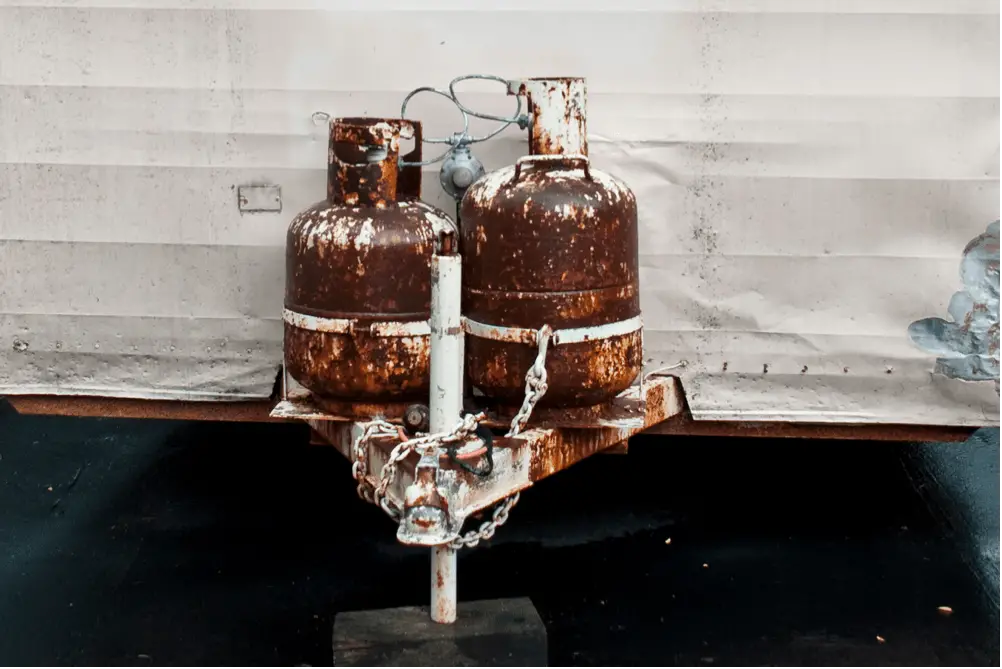If you love going on long trips in your Recreational Vehicle (RV) then you’re pretty aware of how important propane tanks are for your overall living experience. As they are heavily used in RV kitchens, water heating and refrigeration absorption. However, propane tanks are still very hazardous and have their own laws regulated under the state government that are to be met.
In general, RV propane tanks need to be certified according to the rules and regulations of the Federal and State governments. You are advised to recertify your RV propane tanks every 10 years with proper inspection and maintenance to deem them safe and usable.
However, many complications may arrive which are related to legal issues and other safety measures. Hence, in this article, I will be discussing the different aspects of propane tank recertification in your RV. The discussions will range from why, when, and how you will be expected to recertify these tanks.
Why Do I Need to Recertify My Propane Tanks?
Propane tanks provide your RV with necessary heating in terms of cooking, heating water and refrigeration absorption to provide utility convenience. They are an important aspect for providing an overall appropriate living experience in your RVs. Without proper heating, any trip or camping plans may not turn out just as planned if your tanks are empty or outdated.
Propane tanks are susceptible to be damaged and undergo corrosion as time passes, this applies to both DOT cylinders and ASME tanks. Problems like leakage or dents are also possible with propane tanks over time which needs to be dealt with and inspected. These problems can stand as a hazard and threaten the safety of your family and your RV.
Asides from personal safety concerns, you are also advised to recertify your Propane tanks under the hands of State Government laws. You are required to comply under the policies of the Department of Transport (DOT) and American Society of Mechanical Engineers (ASME). Hence, this extends the need for tank recertification a lot further.
You wouldn’t need to worry much if you’re using one-time-use restricted portable propane tanks that are under 20 lbs. Instead of recertifying them, replace them with a newly filled certified propane tank in a retailer to get the job done efficiently and cheaply. Nevertheless, do not try to refill these portable one-time-use tanks as it is both illegal and unsafe.
The following sections down below will focus on DOT cylinders exclusively with few mentions about ASME tanks.
When Do I Know I Have to Recertify My Propane Tanks?
The easiest process is to simply check the manufacturer’s date at the neck around the primary valve of your propane tank. This goes for any sort of Propane tanks whether it be an ASME tank, DOT cylinder, or one-time tanks. Doing this expiration date check whenever you’re using your RV from time to time is a good way to keep yourself aware of recertifying them in future.
The moment you’ll notice an upcoming expiration date on your tank, it’s best that you lay off from using the tank and recertify or exchange them. This process is fairly simple and will save you a lot of hassle later on in terms of refilling, fines and safety measures etc.
Other common signs within your propane tanks that will require urgent recertification are leaks, inefficient heating capability, major dents, or a tank that is heavily repainted. You are also suggested to not make any sort of personal modifications unless you are certified. There are indefinite penalties if you make any alterations to your tanks.
Try to carry out proper maintenance checks such as painting, cleaning, or checking out for rusts or any looseness in valves. If any visual changes develop then you should consider getting them inspected and recertified. If your tanks fail the process of recertification then try to contact trash collection agencies or your local refilling station to safely dispose of them.
How Do I Recertify My Propane Tanks?
Under the hands of certified professional inspectors whose jobs are to inspect and recertify your old propane tanks. Just as mentioned above, you will not be expected to bring any sort of alterations to your propane tanks by any means unless qualified. A legitimate inspection is verified by a valid non-replicable inspection sticker or recertification stamp on your tank.
Any false alterations or modifications can be noticed by refilling station technicians and can be handed over to the authorities. You can perhaps get away without fines with an expired tank but you will almost always be rejected or refilled at stations.
Your inspection will be carried out by a certified RV propane retailer. You will be expected to take your cylinders separately if you own DOT Cylinders. ASME tanks are usually installed permanently and cannot be taken just as easily compared to their portable counterparts. Hence, you will need to hire a qualified inspector to have them inspected periodically.
While at refilling stations, you are advised to let the certified technicians carry out the refilling process. They will utilize proper knowledge and tools to check for leaks and carry out pressure tests on the main valve of your tanks if you ask them for a safety inspection.
If you ever feel lost about where to get your Propane tanks recertified, you can always ask the technicians for the contact details of inspectors. You can also perhaps resort to various online forums available on the internet that are based on the RV propane tank recertification process.
Usually, recertification processes cost about 20-60$ depending on how big your tanks are, the damages involved, and where you get them done. However, consider only recertifying your expired tanks if they are large DOT cylinders. One-time cylinders are better off being replaced with a newly certified one as it’s cheaper and safer.
How Often Am I Expected to Recertify My Propane tanks?
This depends on what kind of propane tank you own. The two most common Propane Tank types include DOT cylinders and ASME tanks.
ASME tanks as approved by the American Society of Mechanical Engineers do not usually need to be recertified as they are heavy permanent tanks. They however will require proper inspection under a certified inspector for any external damages or leaks. These periodic inspections are also mandatory under federal laws.
Since they are heavy and quite difficult to be removed, it is advised you don’t do so without the help of a professional. Change them only if they have been severely damaged or have become too old. ASME tanks are usually installed while being certified.
DOT cylinders on the other hand are only meant to last for about 12 years before being recertified. After a cylinder has been recertified for the first time, it will be required to undergo the same process every five years. You can also easily swap them out at your own expense at a refilling station but you are advised to not do so for larger cylinders.
The inspection that takes place for DOT cylinders every 5 years will mostly be visually inspected. You can even decide to trade smaller DOT cylinders in for replacement if you don’t want the hassle of recertification to continue.
Remember, your propane will never go bad or limit any sort of performance. The gas itself will stay the way it is. It’s your container that’s the problem. Hence, you will only need to focus on maintaining the cylinder under careful supervision.
Aside from all that, don’t worry much if your cylinders have exceeded their certification limit. Just get it replaced as soon as possible for your safety and keep them away from your RV until you have a new inspection sticker on it.
Conclusion
So, have I answered your questions regarding the need for RV Propane tanks to be recertified and how often you should do them? Though I understand that it’s not always possible to be worried about this issue especially when you’re busy with other aspects of life.
It’s still wise to keep your head up for any sort of shortcomings that may come up with an incompetent RV Propane tank. Not only will they risk your safety, get yourself rejected at filling stations but you will be pressurized by the law as well. Nonetheless, it’s always the safer game to just stay aware of this minor thing from time to time and act accordingly.


